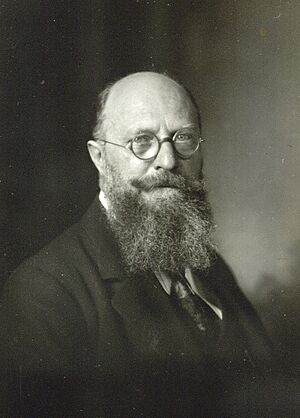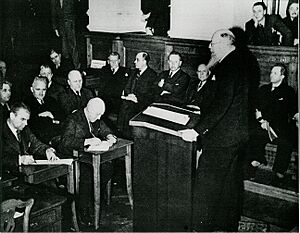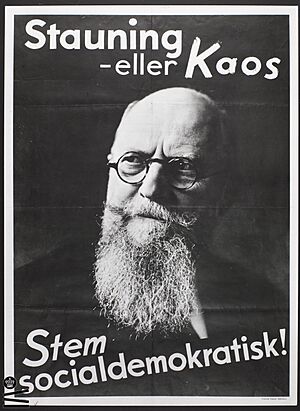Thorvald Stauning facts for kids
Quick facts for kids
Thorvald Stauning
|
|
|---|---|

Stauning in 1927
|
|
| 9th Prime Minister of Denmark | |
| In office 24 April 1924 – 14 December 1926 |
|
| Monarch | Christian X |
| Preceded by | Niels Neergaard |
| Succeeded by | Thomas Madsen-Mygdal |
| In office 30 April 1929 – 3 May 1942 |
|
| Monarch | Christian X |
| Preceded by | Thomas Madsen-Mygdal |
| Succeeded by | Vilhelm Buhl |
| Minister of Defence | |
| In office 31 May 1933 – 4 November 1935 |
|
| Prime Minister | Himself |
| Preceded by | Hans Peter Hansen |
| Succeeded by | Alsing Andersen |
| Personal details | |
| Born | 26 October 1873 Copenhagen, Denmark |
| Died | 3 May 1942 (aged 68) Copenhagen, Denmark |
| Political party | Social Democrats |
Thorvald August Marinus Stauning (born October 26, 1873, in Copenhagen; died May 3, 1942) was a very important Danish politician. He became the first Prime Minister from the Social Democratic party. He led Denmark twice, first from 1924 to 1926, and then again from 1929 until he passed away in 1942.
Under Stauning's leadership, Denmark became a country with a strong social welfare system. This means the government helped its citizens with things like healthcare and support for those in need. Even though he faced many challenges, his leadership during tough times made him one of Denmark's most respected leaders of the 20th century. A large mountain range in Greenland, called the Stauning Alps, was named after him.
Contents
Stauning's Political Journey
Thorvald Stauning started his career by sorting cigars. He quickly became involved in trade union activities, which are groups that protect workers' rights.
Early Career and Parliament
From 1896 to 1908, Stauning was a leader in the Cigar Sorters' Union. He also edited a magazine for trade unions. In 1906, he was elected to the Danish Parliament, known as the Folketing. In 1910, he became the chairman of the Social Democratic Party. He held this important position for almost 30 years, until 1939. From 1916 to 1920, he served as a minister in the government without a specific department.
Becoming Prime Minister
In 1924, Thorvald Stauning became the Prime Minister of Denmark for the first time. His government was a "minority cabinet," meaning his party didn't have the most seats in Parliament, but they still formed the government. This was a big step because it was the first time the Social Democratic Party led the country on its own.
His government was also special because it included Nina Bang, who became the Minister of Education. She was one of the first women in the world to hold a ministerial position, which gained international attention.
Leading Denmark Through Challenges
Stauning became Prime Minister again in 1929. This time, he led a "coalition cabinet" with another party called Det Radikale Venstre. This government helped Denmark get through the Great Depression, a time when many people lost their jobs and money. They made important agreements that improved the Danish economy.
Under Stauning, Denmark developed a strong social welfare state. This system helped make sure people had support when they needed it. Many believe that his long-lasting government helped prevent extreme political movements, like communism and fascism, from becoming powerful in Denmark, unlike in some other parts of Europe.
In 1933, Stauning's government made a very important agreement called the Kanslergade settlement. This agreement, named after Stauning's apartment, included help for farmers and major changes to social support programs.
Stauning holds a record in Danish politics for winning re-election three times (in 1932, 1935, and 1939). His famous slogan for the 1935 election was "Stauning or Chaos!" However, in 1939, an attempt to change the Danish Constitution failed because not enough people voted in the referendum. This was a big disappointment for Stauning, and he considered resigning, but he was convinced to stay.
During World War II
Stauning's second government continued until April 9, 1940, when Nazi Germany invaded Denmark. This event was called Operation Weserübung. After the invasion, Stauning's government expanded to include all political parties, forming the Stauning III Cabinet.
Unlike many other countries invaded by the Nazis, Denmark's King Christian X and his government decided to stop fighting and remain in their country. This choice is thought to have made the Nazi leaders treat Denmark more leniently than other occupied nations. Thorvald Stauning passed away in 1942 while still serving as Prime Minister.
Stauning's Lasting Impact
Thorvald Stauning was a very inspiring leader. He played a key role in bringing Danish society together after big changes from the Industrial Revolution and when more people gained the right to vote. His election slogan, "Stauning or Chaos," was very powerful during a time of high unemployment and economic problems, especially because of what was happening in neighboring Germany.
The Great Depression caused unemployment in Denmark to reach very high levels. During this difficult time, people looked for leaders who could offer hope and a clear plan. Stauning was that leader for Denmark. His popularity helped the Social Democratic Party win 46% of the votes in the 1935 election, a record that no Danish party has reached since.
Stauning was given a state funeral in 1942, an honor usually not given to Danish prime ministers. He is buried in Copenhagen's Vestre Cemetery. Even though Denmark's relationship with Germany during World War II has been debated, Stauning's legacy in Denmark remains very positive. His popularity in the 1930s helped limit the growth of other populist parties, including the Nazi party, which never became very strong in Denmark.
Stauning also helped solve the Easter Crisis of 1920, a constitutional crisis. He worked out a deal with the king, where the monarch agreed to have a more symbolic role, without interfering in how the parliamentary democracy worked. In return, Stauning made sure his party supported the continuation of the Danish monarchy. His government also laid the groundwork for Denmark's future welfare state, which provides many social benefits to its citizens.
Stauning's grandson, Søren Goldmann Stauning, is also involved in local politics in Them.
 | Dorothy Vaughan |
 | Charles Henry Turner |
 | Hildrus Poindexter |
 | Henry Cecil McBay |



